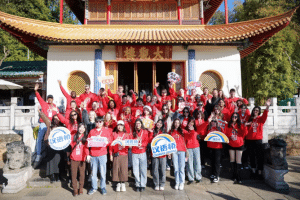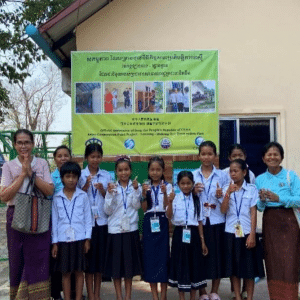On January 1st, the ‘Law of the People’s Republic of China on the Administration of Activities of Overseas Non-Governmental Organizations within the Territory of China’ came into effect (hereinafter referred to as the ONGO Law). Since then an increasing number of ONGOs have registered their representative organizations (ROs) or recorded their temporary activities in Mainland China, including some international NGOs which had previously registered or established offices in Hong Kong.
According to the “Research Report 2016 on the Implementation of Funding and Services by Hong Kong Charitable Organizations in Mainland China (Conference Version)” jointly issued by the China Philanthropy Research Institute of Beijing Normal University and Oxfam Hong Kong on October 20 2016, Hong Kong NGOs have been operating charitable activities in the Mainland for more than 30 years. They have provided substantial funds and human and intellectual support for poverty alleviation, disaster relief, education and social services, which have had a tremendous impact on the progress of charitable undertakings in Mainland China. In view of this fact, this article will make a systematic review of the registration and recording of temporary activities of Hong Kong NGOs in Mainland China since the ONGO Law went into effect in January, in order to provide reference for NGOs from Hong Kong operating in the Mainland which have not yet registered representative organizations or recorded their temporary activities.
The Status of Hong Kong NGOs’ Registering Representative Organizations in the Mainland
(1) Hong Kong NGOs comprised 28% of all ONGOs successfully registering, with a small number of organizations having several representative offices.
According to the public information available on the overseas NGOs service platform, by June 1st 2017 90 overseas NGOs had registered in the Mainland. 25 of these were from Hong Kong, accounting for 28% of the total (please refer to Table 1 for a detailed list). Among the 25 successfully registered representative offices (ROs), 6 were registered by World Vision (Hong Kong) in Guangdong, Yunnan, Guizhou, Jiangxi, Tianjin and Guangxi, 2 by International Professional Services Limited (Hong Kong) in Sichuan and Yunnan, and the remaining 17 offices were registered by separate Hong Kong NGOs. Out of the 25 ROs, 12 were established by social service organizations, 8 by foundations, and 5 by industry associations.
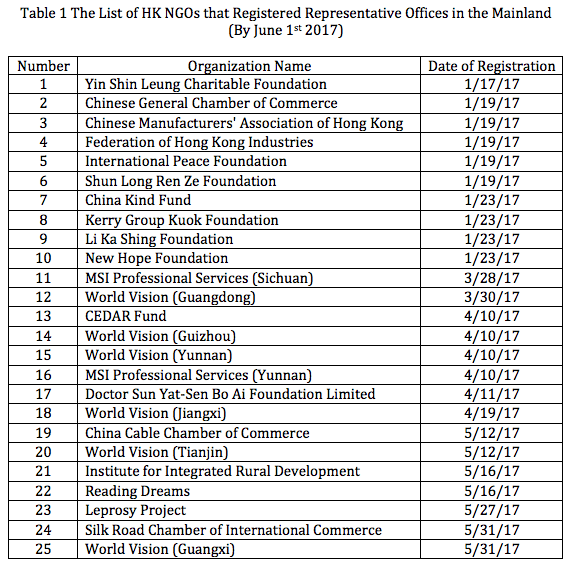
(2) The peaks in registrations, in January and April, are in line with the overall trend for ONGOs.
As shown in Graph 1, the registration of ROs by Hong Kong NGOs in the Mainland peaked in January and April, coinciding with the overall trend for ONGOs that successfully registered. According to the “Report on the Implementation of the ONGO Law” issued by the China Philanthropy Research Institute, the peak in registrations in January mainly came from the transfer of ONGOs that had previously registered under the civil affairs departments or the industry and commerce departments. The April peak on the other hand came from ONGOs that had figured out the registration process and then registered. The number of registrations in May was slightly higher than in April, which also proves that Hong Kong NGOs have gradually become more familiar with the registration process. The number of future registrations is expected to remain on the rise.
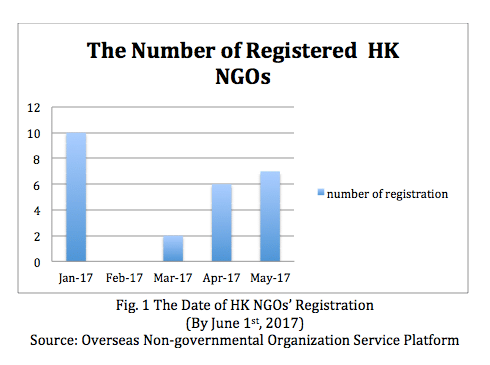
(3) 7 ONGOs were previously registered under the Ministry of Civil Affairs and 9 organizations had previously been recorded in the Yunnan provincial Civil Affairs Department.
Looking at the organizations’ original registration status, out of the 25 registered Hong Kong NGO ROs, 7 had previously registered ROs under the Ministry of Civil Affairs, as shown in figure 2. All of these seven organizations were handed over to public security departments and officially registered as ROs of ONGOs when the ONGO Law had just been implemented, in January 2017. Other nine organizations which had previously been recorded in the Yunnan provincial Civil Affairs Department re-registered according to the ONGO Law, including World Vision (Hong Kong) and the International Professional Services Limited (Hong Kong), which have established a number of ROs. In addition to registering a Yunnan representative office, these two organizations also registered offices in other provinces or regions. This was done in accordance with the ONGO Law’s Article 18, which lists the requirements for organizations to carry out activities in different provinces.
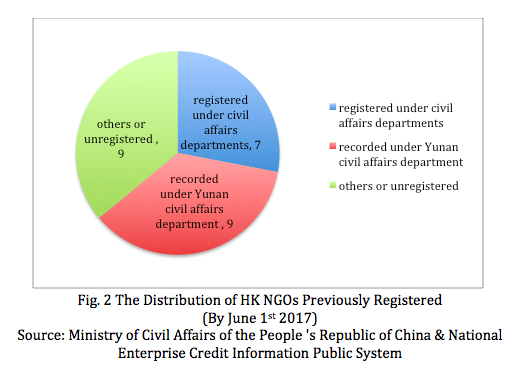
(4) Most organizations chose Guangdong for registration, convenience being the main consideration.
In terms of geographic distribution, a total of seven Hong Kong NGOs registered their ROs in Guangdong and four in Beijing (see Figure 3). Geographical convenience is the main consideration for NGOs from Hong Kong. Therefore, the majority of organizations have chosen to establish their ROs in Guangdong, so that they can keep a close contact with their head offices in Hong Kong, while the ROs registered in Beijing can cover activities across the whole country. In addition, the three NGOs from Hong Kong that registered their ROs in Yunnan were the ones previously recorded under the civil affairs department of Yunnan Province.
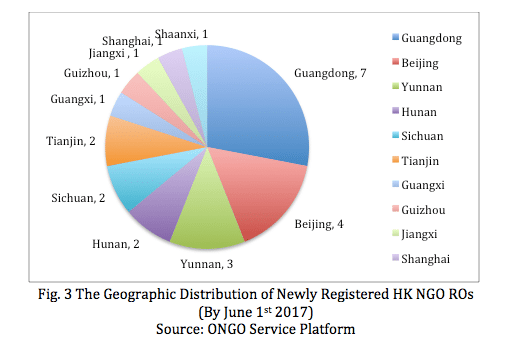
(5) The fields of work vary, while the civil affairs departments and the trade and commerce departments remain the most common Professional Supervisory Units (PSUs).
In terms of their officially registered fields of work, Hong Kong NGOs mainly engage in poverty alleviation, education, disaster relief and child services, as can be seen in table 2. They focus on providing relevant services to disadvantaged and vulnerable groups in the Mainland in order to improve their quality of life. In addition, the five organizations registered as chambers of commerce which we mentioned earlier mainly provide member services, build industry exchange platforms and promote business services.
As can be seen in Table 2 and Figure 4, the departments of commerce and the departments of civil affairs are the most common PSUs. Five out of the six ROs that have the commerce departments as their PSUs are the already mentioned chambers of commerce. Despite doing similar work on child services and disaster relief, five out of the six ROs of World Vision – China Foundation Limited (Hong Kong) registered under the civil affairs departments while the remaining one registered under the department of poverty alleviation and development.
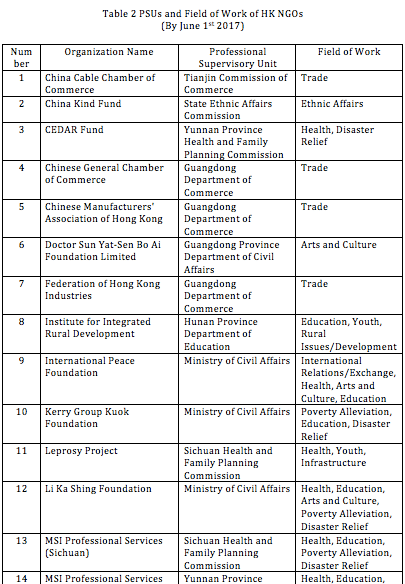
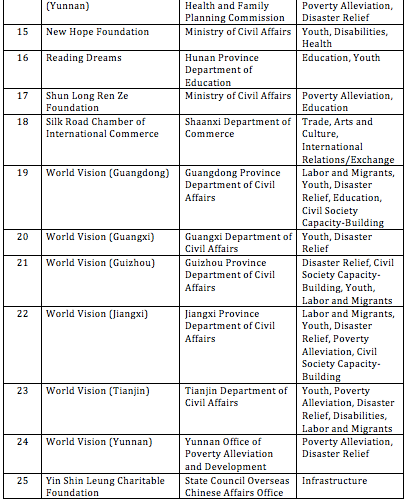
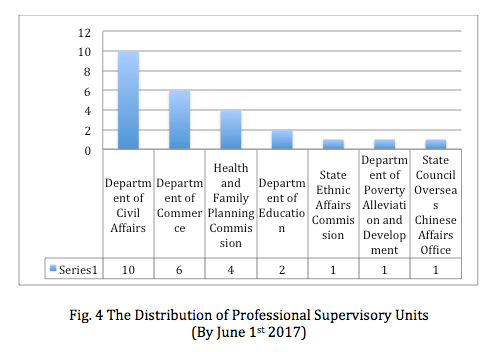
The situation concerning Hong Kong NGOs Filing Temporary Activities in the Mainland
(1) Temporary activities filed by Hong Kong NGOs account for 65% of the total.
According to article 16 and 17 of the ONGO Law, “overseas NGOs that have not established representative offices but need to conduct temporary activities in the mainland of China shall do so in cooperation with state organs, people’s organizations, public institutions and social organizations (hereinafter referred to as “Chinese partners”). The Chinese partner units shall follow national provisions to handle approval formalities, and file to the registration management organs that are responsible for the area of the proposed activity at least 15 days before the temporary activities are carried out. Chinese partners of overseas NGOs conducting temporary activities shall handle examination and approval procedures in accordance with State regulations and record under local registration authorities 15 (fifteen) days before temporary activities commence”.
According to the public information on the ONGO service platform, by June 1st 2017 there had been 84 filings of temporary activities, of which 55 were carried out by Hong Kong NGOs, accounting for 65% of the total.
(2) Out of the 18 Hong Kong NGOs that filed temporary activities, Oxfam has the highest number of filings.
A total of 55 temporary activities were filed by 18 Hong Kong NGOs, out of which seven organizations filed at least two activities. As shown in Figure 5, Oxfam holds the highest number for temporary activities filed – 25; 12 of them were carried out in areas of the Beichuan Qiang Autonomous County, Sichuan, while the remaining 13 activities were all over the country, including Guangxi, Shaanxi, Guangdong, Anhui, Gansu, Guizhou and Qinghai.
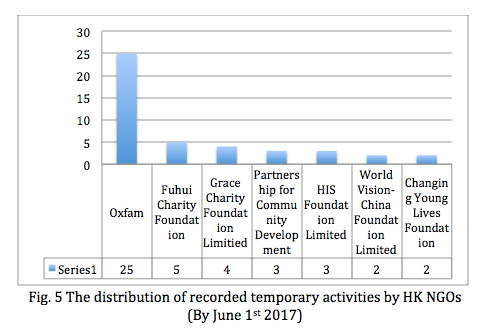
(3) 46% of temporary activities have a duration from half a year to one year.
As for the duration of temporary activities, as shown in Figure 6, 25 of the temporary activities have a duration from half a year to one year, accounting for 46%; 11 of them have a duration of less than a week, accounting for 20%; 10 of them have a duration of a year, accounting for 18%. Therefore, we can see that the temporary activities are mainly extremely short-term or medium/long-term. The number of short-term temporary activities of a duration between one week and six months counts for only 16% of all the activities.
According to Article 17 of the ONGO Law, “the duration of temporary activities shall not exceed 1 (one) year. Where there is a need to extend this deadline, documentation and information shall be re-submitted for the record”. At present, all the temporary activities filed by HK NGOs fall within this time limit.
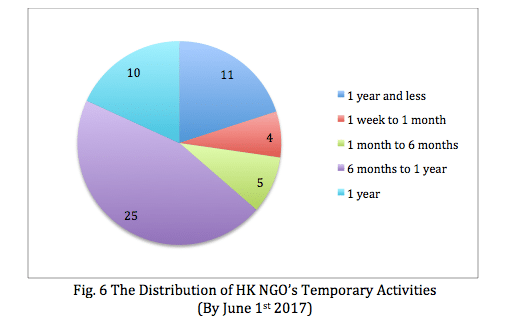
(4) Disaster relief and financial aid for disadvantaged students are the main fields of temporary activities.
Looking at the fields of temporary activities, as shown in Figure 7, the most popular field is financial aid with 13 activities, followed by disaster prevention and mitigation, community development and industry capacity building, accounting for 22%, 15% and 11% respectively.
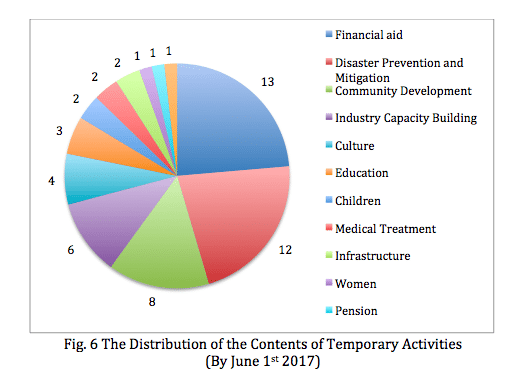
Note:
By June 7th 2017, 93 ONGOs had registered representative offices in the Mainland, of which Hong Kong NGOs accounted for 26. Newly registered ROs include the Oxfam (Hong Kong) Guangdong office, which registered on June 2nd. In addition, by the same date, ONGOs had filed a total of 90 temporary activities.
References:
[1] Part of the analysis angle and framework refers to “Analysis Report on the Implementation of the Law of the People’s Republic of China on the Administration of the Activities of Overseas Non-Governmental Organizations ’” issued by the China Philanthropy Research Institute, http://www.bnu1.org/research/policy/3682.html
[2] Wang Zhengyao et al., “Research Report 2016 on the Implementation of Funding and Services by Hong Kong Charitable Organizations in Mainland China ” (Conference Version), p5.
[3] China Philanthropy Research Institute, “Analysis Report on the Implementation of the Law of the People’s Republic of China on the Administration of the Activities of Overseas Non-Governmental Organizations”, http://www.bnu1.org/research/policy/3682.html.


